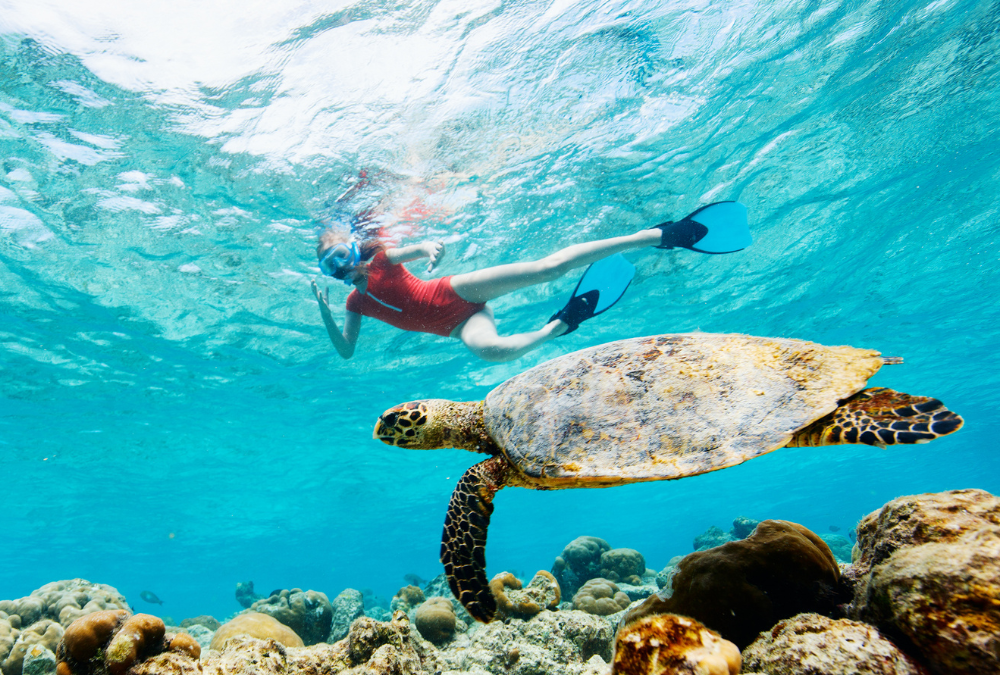Are you ready to dive into the world of underwater adventures with snorkeling vs scuba diving? Snorkeling and scuba diving are two incredibly popular activities that allow you to explore the fascinating world beneath the waves. Whether you’re a beginner looking to dip your toes into the water or an experienced underwater explorer, it’s important to understand the key differences between snorkeling and scuba diving before taking the plunge. In this article, we will compare these two exciting activities and help you determine which one is the right choice for you.
Table of Contents
Snorkeling vs Scuba Diving: Key Differences Explained
Let’s start by exploring the fundamental differences between snorkeling and scuba diving. Snorkeling is a surface-level activity that involves swimming near the water’s surface while wearing a mask and snorkel. This allows you to observe the underwater world without fully submerging. On the other hand, scuba diving involves wearing a complete set of diving gear, including a tank of compressed air, which allows you to venture deeper beneath the surface.
While snorkeling offers a more accessible and straightforward experience, scuba diving provides the opportunity to delve into the depths and explore a whole new dimension of marine life. It’s important to consider your comfort level in the water and your desire for a more immersive experience when deciding between these two options.
One key difference between snorkeling and scuba diving is the level of training required. Snorkeling is relatively easy to learn and can be enjoyed by people of all ages, making it a popular choice for families and beginners. In contrast, scuba diving requires certification and training to ensure safety underwater. This certification process involves learning about dive theory, practicing essential skills in a controlled environment, and demonstrating competency in open water.
Additionally, the equipment used in snorkeling and scuba diving varies significantly. Snorkelers typically only need a mask, snorkel, and fins to explore the underwater world, while scuba divers rely on a more extensive gear setup, including a buoyancy control device, regulator, dive computer, and exposure suit. The complexity of scuba diving equipment allows divers to stay underwater for longer periods and explore deeper depths with the necessary support and safety measures.
Snorkeling vs Scuba Diving: Which is Easier for Beginners?
If you’re new to underwater adventures, you might be wondering which activity is more beginner-friendly. Snorkeling is generally considered easier for beginners due to its simplicity and minimal equipment requirements. With just a mask, snorkel, and fins, you can easily learn the basics and start exploring the underwater world. Snorkeling also allows you to stay within your comfort zone by staying near the surface and observing marine life from above.
Scuba diving, on the other hand, requires more training and equipment. Before diving, you’ll need to complete a certification course where you’ll learn essential skills, such as equalizing pressure, managing your air supply, and underwater communication. While scuba diving may require more preparation and practice, it offers the opportunity to explore deeper dive sites and interact with marine life up close.
One of the key differences between snorkeling and scuba diving is the depth at which you can explore the underwater world. Snorkeling typically allows you to stay at the surface or dive down a few feet, while scuba diving opens up the possibility of descending to much greater depths. This difference in depth can lead to unique experiences, as deeper dive sites often feature different marine life and underwater landscapes.
Additionally, scuba diving provides a sense of weightlessness and freedom that is unmatched by snorkeling. As you descend into the depths, you’ll feel the pressure of the water surrounding you, creating a truly immersive experience. The ability to move in three dimensions underwater, coupled with the silence of the deep sea, can be both exhilarating and calming at the same time. While scuba diving may require more initial effort and training, the rewards of exploring the underwater world in this way are truly unparalleled.
Snorkeling vs Scuba Diving: Comparing Costs and Accessibility
Cost and accessibility are important factors to consider when choosing between snorkeling and scuba diving. Snorkeling has a lower barrier to entry in terms of cost and equipment. You can easily purchase or rent affordable snorkeling gear, and many popular beach destinations offer snorkel rental services. Snorkeling can be enjoyed in shallow waters close to shore, making it accessible to swimmers of all skill levels.
Scuba diving, on the other hand, requires more significant investments. In addition to the certification course fees, you’ll need to purchase or rent scuba gear, including a wetsuit, regulator, buoyancy control device, and tanks. Dive trips to more remote or exclusive locations may also incur additional expenses. It’s important to consider your budget and accessibility to dive sites when deciding if scuba diving is the right choice for you.
Equipment Essentials for Each Sport
Let’s take a closer look at the equipment essentials for both snorkeling and scuba diving.
Snorkeling Equipment:
- Mask
- Snorkel
- Fins
- Rash guard or wetsuit (optional)
Scuba Diving Equipment:
- Mask
- Snorkel
- Fins
- Regulator
- Buoyancy control device
- Dive computer or depth gauge
- Wetsuit or drysuit
- Tank and weights
As you can see, scuba diving requires additional gear to ensure your safety and comfort while underwater. The extra equipment allows you to regulate your buoyancy, monitor your air supply, and navigate underwater environments effectively.
Safety Protocols: Staying Safe Underwater
Ensuring your safety is of utmost importance when engaging in any underwater activity.
When snorkeling, it’s essential to choose calm and clear waters, avoid strong currents, and stay aware of your surroundings. Always swim with a buddy and familiarize yourself with the signs of marine life to avoid potential hazards. Additionally, wearing a rash guard or wetsuit can protect your skin from sunburn and minor scratches.
Scuba diving requires strict adherence to safety protocols due to the added risks associated with deeper dives and extended periods underwater. Obtaining proper certification is crucial to learn essential safety procedures and techniques. Dive within your training limits, constantly monitor your air supply and depth, and communicate effectively with your dive buddy or instructor.
Physical Requirements and Health Considerations
Both snorkeling and scuba diving require a certain level of physical fitness and good health.
Snorkeling is a low-impact activity that can be enjoyed by individuals of various fitness levels. However, it’s important to have basic swimming skills and be comfortable in the water. If you have any pre-existing medical conditions or concerns, it’s recommended to consult with a healthcare professional before snorkeling.
Scuba diving places additional physical demands on the body due to the increased water pressure at depth. It’s important to be in good overall health and have a reasonable level of physical fitness. Before embarking on a scuba diving adventure, you’ll be required to complete a medical questionnaire to ensure you are fit to dive. Certain medical conditions, such as heart or lung problems, may restrict your ability to scuba dive.
Marine Life Encounters: What Can You Expect?
One of the most exciting aspects of snorkeling and scuba diving is the opportunity to witness the incredible diversity of marine life.
While snorkeling, you can expect to encounter beautiful coral reefs, schools of tropical fish, and perhaps even turtles or rays. Snorkeling allows for a more passive interaction with marine life, as you observe them from the surface. However, it’s crucial to respect their natural habitat and avoid touching or disturbing the creatures you encounter.
Scuba diving offers a more intimate and up-close encounter with marine life. Depending on your dive location, you may have the chance to spot larger species such as sharks, dolphins, or even whales. Additionally, diving allows you to explore dive sites with intricate coral formations and vibrant marine ecosystems.
Ideal Destinations for Snorkelers and Divers
Both snorkelers and scuba divers have a wide range of destinations to choose from to satisfy their underwater cravings. Some popular snorkeling destinations include the Great Barrier Reef in Australia, the Maldives, Hawaii, USA, the Red Sea in Egypt, and the Phi Phi Islands in Thailand. For scuba diving enthusiasts, consider exploring Belize’s Great Blue Hole, cenote diving in Mexico’s Yucatan Peninsula, the Galapagos Islands in Ecuador, the Similan Islands in Thailand, and the Barracuda Point in Sipadan Island, Malaysia. Remember, these are just a few examples, and there are countless other remarkable diving destinations around the world waiting to be explored.
Adding to the allure of tropical adventures, the U.S. Virgin Islands offer an exceptional setting for both snorkeling and scuba diving, making it one of the premier affordable wedding venues for underwater enthusiasts. The islands’ crystal-clear waters provide incredible visibility, revealing vibrant coral reefs teeming with a diverse array of marine life. From sea turtles and rays to a multitude of brilliantly colored fish, the underwater world of the U.S. Virgin Islands is a dynamic showcase of nature’s artistry.
In St. John, Trunk Bay and the serene waters around Waterlemon Cay offer marked trails with underwater plaques that educate visitors about the local marine life, making them ideal for both beginners and experienced snorkelers. Meanwhile, St. Croix’s Cane Bay Beach, known as “The Wall,” is a must-visit for divers, with its dramatic drop-off close to the shore that houses a rich ecosystem of tropical fish, reef sharks, and during certain seasons, migrating humpback whales.
St. Thomas offers unique experiences like the hybrid snorkeling-scuba activity, SNUBA, at Coral World Ocean Park near Coki Beach, and tranquil snorkeling at Sapphire Beach, where the shallow reefs are home to a variety of marine life, nestled in beautiful brain coral formations. These spots in the Virgin Islands not only enhance the region’s reputation as a top destination for marine exploration but also provide memorable, cost-effective options for adventure seekers.
These destinations, each with their own unique characteristics, ensure that whether you choose to snorkel or dive, your experience will be unforgettable. Whether it’s the vibrant life under the sea or the lush, tranquil beaches, the Virgin Islands offer a perfect blend of relaxation and adventure for your special day or a simple getaway.
The Environmental Impact of Each Activity
As responsible adventurers, it’s important to consider the environmental impact of our actions and make conscious choices to protect fragile marine ecosystems.
Snorkeling has a minimal impact on the environment if practiced responsibly. Avoid stepping on coral reefs, touching marine creatures, or leaving any trash behind. Choose reef-safe sunscreens to protect your skin without harming coral or other marine life.
Scuba diving, while allowing for deeper exploration, also entails greater risks of accidental damage to fragile marine ecosystems. Proper buoyancy control and finning techniques can minimize disturbances to the surrounding environment. Participating in underwater clean-up activities and supporting conservation efforts can also help preserve these precious underwater habitats.
Getting Certified: Next Steps for Scuba Diving
If scuba diving has captured your interest and you’re ready to take your underwater adventures to new depths, getting certified is your next step.
To become a certified scuba diver, you’ll need to complete a scuba diving course from a reputable certification agency such as PADI (Professional Association of Diving Instructors) or SSI (Scuba Schools International). These courses typically include classroom sessions, pool practice, and open water dives under the guidance of a certified instructor.
Once you’re certified, a whole new world of underwater exploration awaits you. From tropical reefs to historic shipwrecks, the possibilities are endless.
Now that you have a better understanding of the differences between snorkeling and scuba diving, it’s time to make an informed decision based on your preferences, experience level, and budget. Whichever adventure you choose, remember to immerse yourself in the wonders of the underwater world while respecting and preserving its beauty for future generations to enjoy.

